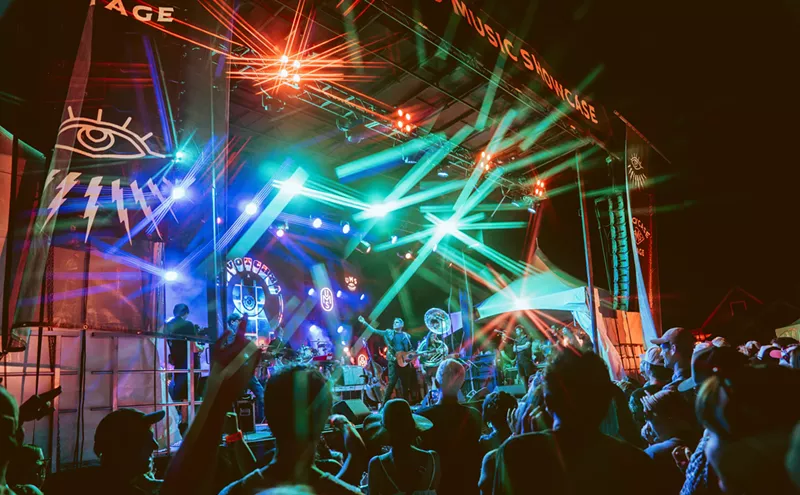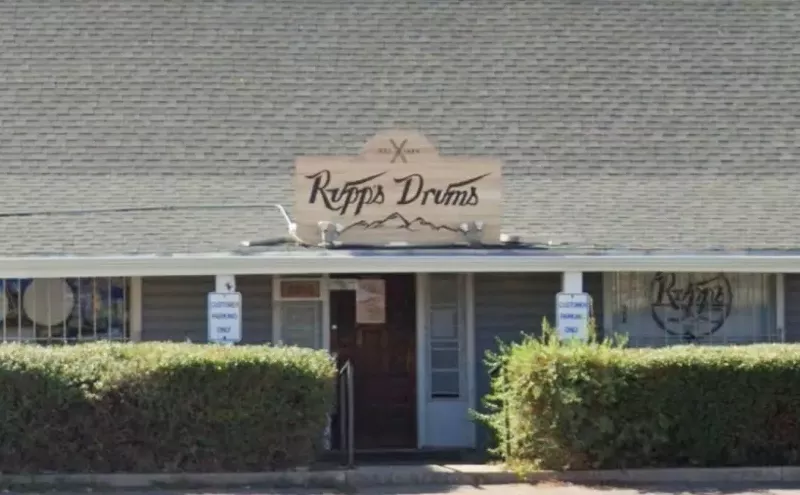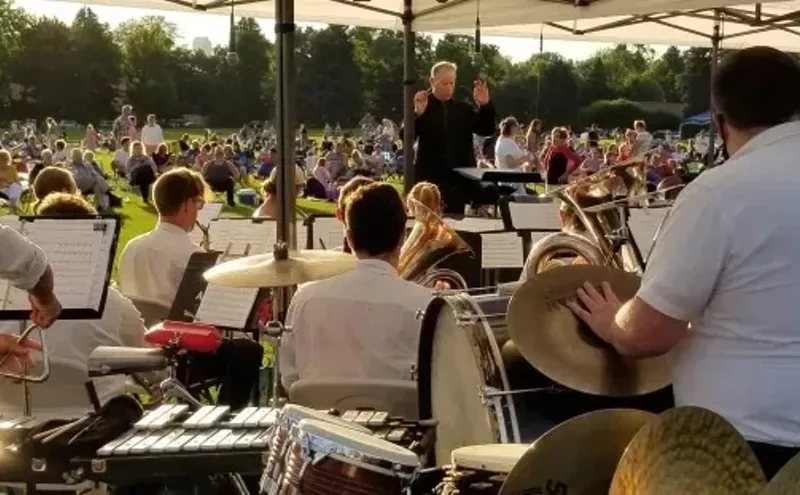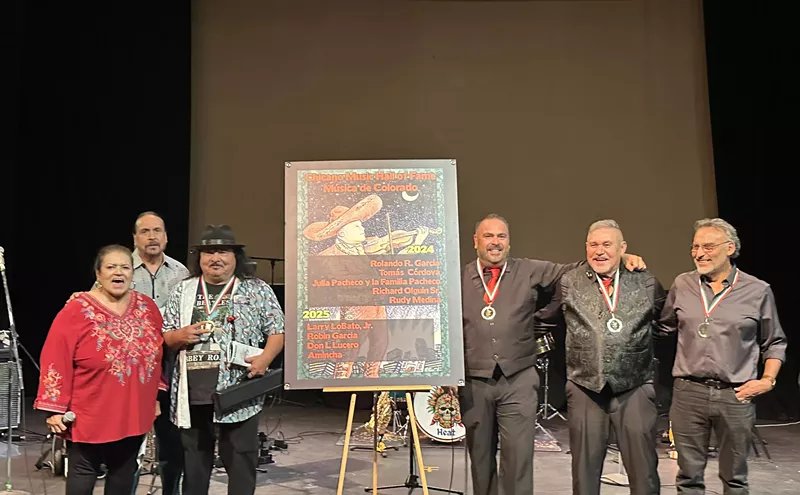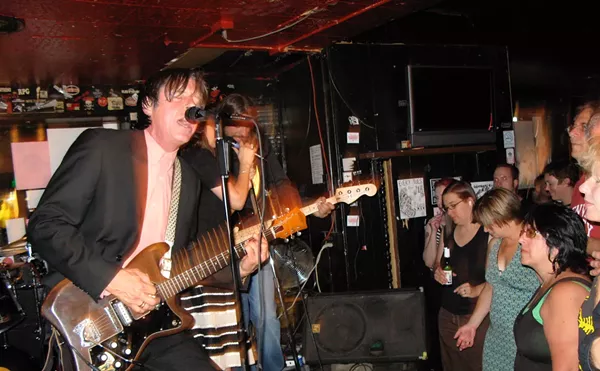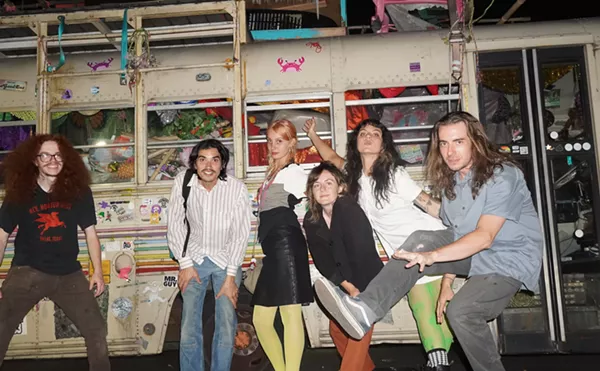Battles (due tomorrow at the Westword Music Showcase on the main Stage) first came together when Ian Williams, a former guitarist in math rock pioneers Don Caballero, moved to New York and got lured back into playing live music. He ended up working with like-minded musicians with their own backgrounds in avant-garde music steeped in technique and intricacy. Battles has since released two critically-acclaimed albums in 2007's Mirrored and Gloss Drop from 2011.
Between both albums, founding member Tyondai Braxton parted company with Battles leaving the remaining trio to essentially rewrite the second album. That kind of struggle might have taken the creative drive out of most bands, but it just meant Battles took some more chances and brought in other people in experimental music -- including Yamantaka Eye of the Boredoms, Gary Numan and Kazu Makino of Blonde Redhead -- that the guys thought resonated with their music for cameo appearances. We recently spoke to Williams about the formation of the band, its recent remix record Dross Glop and its curating All Tomorrow's Parties this past December.
Westword: How did you get started playing music, and what lead to your interest in a more precise technique in musicianship?
Ian Williams: I guess the stock answer: I liked music so I wanted to make it. I mean, there was some pivotal moment in my childhood where I realized being a sports star wasn't really going to happen. Probably when I was twelve years old the idea of being in a punk rock band seemed a lot cooler or something like that.
I've always been exposed to a lot of different kinds of music and it's sort of synthesized into this style that I like to make and I've never really resolved the fact that it doesn't necessarily always go together. In a lot of ways, I kind of came from the generation that borrowed musical ideas from King Crimson or something except it was done more with the attitude of Black Flag. It was combining different eras into one thing. And I never really bothered to worry about the fact that those things don't necessarily go together.
You were a member of Don Caballero. Presumably you haven't been involved with that project in the last ten years?
No, we broke up in 2000. Then it kind of confused things a bit because Damon [Che] started doing it again a few years after that. I honestly don't know if he's doing it now. I was on all the Touch & Go Records from 1993 to 2000.
You didn't form Battles right after Don Caballero, did you?
No, I moved to New York when Don Cab stopped at the end of 2000 then I took a year. Being in a band with Damon was such a personally exhausting experience. So I was like, "Man, I don't want to do another band." I didn't know what to do. Out of dumb habit, like an animal, I started just playing solo shows without thinking of it in terms of a career or anything. It was just like, "Okay, I'll go to CBGBs and go on stage and do something." Not even really thinking about how it added up to anything.
Sadly, eventually I asked more people to play with me. The funny thing is that the only idea I had in my head, I was like, "I want to do this thing with cheerleaders." I saw that movie Bring It On and I saw that as my next musical project. It was really strange going about the casting of finding the ladies to work with. The only thing is that I kept on filling out the musical side and I asked [Tyondai Braxton] and Dave [Konopka] and finally John [Stanier], the drummer.
By the time John was doing it, it was actually a band. And I thought, "Maybe we should think of a band name." Eventually the whole issue of the cheerleader thing became kind of overwhelming and people started offering us shows and it was like, "Okay, Battles will play." Then it just became a four piece band with dudes. And it was, "Now I'm back in the same position in an instrumental band with dudes." The rest you might now because we sold some records and toured. That confusing moment I'm talking about was two years of 2000 through 2002.
So originally you had an idea for a cheerleader act with some music to go along with it?
Yeah. I've since figured it out. I know now how I should have gone about it. There's this great, Dominican/Puerto Rican bar in Manhattan and the waitresses are all so perfect for the role. But life works in funny ways. But I realized it was okay. "Oh, I'm in a band again. Do I want to tour around the country in a van with these dudes?" But it was actually okay and I ended up having fun.
Is it true you were in the movie High Fidelity?
Yes, that is true. It was just me chewing bubble gum or something and talking [to someone else in the store]. Don't blink. It's a quick scene.
How did you end up even in that small part?
The honest truth is that I was packing boxes one day. I was doing Don Cab and Storm & Stress for three or four years in Chicago in the late '90s. But I was doing this odd job for Drag City and I think they were moving offices, and I was carrying stuff for them. Dan [Koretzky], the owner of Drag City, kind of grew up with one of the screenwriters D.V. Devicentis and John Cusack.
They were three buddies from the northern suburbs of Chicago. So there was some connection. Out of the blue a casting agent came over to the Drag City office to see if there was anyone who looked like they could be in the movie. They stuffed the movie with local Chicago musicians and they get us and they paid us.
When Battles was coming together, did you already know those guys before coming together as a band?
I knew everybody from a different aspect of being in bands before. Helmet and Don Cab in the big bad early '90s would play together sometimes, back during the "nga-nga-nga nga-nga-nga" days.
Oh you mean around the time Meantime came out?
Exactly. So I knew John from that. Dave I knew because he was in a college band when he went to art school in Boston called Lynx. They were young kids but they were these kind of wise-ass Boston kids and I thought they were really funny guys. So when Don Cab would play in Boston, they would play with us sometimes. I bumped into him on the streets of New York when I moved here. Tyondai I knew him because he actually came to one of the solo shows I did in that early period when I was in New York. I was like the common factor in knowing everybody.
In what ways would you say those guys have challenged and inspired you in making the music you have made since with them?
I think everybody has a different [thing they bring to the band]. John, as a drummer, has style that's very precise, very machine-like. My natural instinct is to be more all over the place. More [intuitive,] maybe. Like more of a minimalism than the maximalism. He knows how many measures have passed and all of this stuff. Where I'm a go-with-the-flow type. I'm self-taught. When I was younger, I came to realize that I didn't need permission to do it the right way; I could do it my own way. That's my greatest and my worst asset: Finding my own strange ways to do things because I don't know how to do it any other way.
John is very natural at what he does. It's always a challenge to sort of translate my ideas into his ideas and somehow make them make sense. I figure somehow that challenge creates good results. Dave is a very meticulous beat person because he comes from a design background. With designers, you know, everything is in the right place all the time. I'm more of a sprawling mess, usually, a lot of opposites.
The remixes that appear on Dross Glop put kind of a new spin on your sound. Why did you want to release something like that?
I guess to some degree being on Warp Records, we do have a bit of a foot into that dance world. It was such an easy, natural thing to do. I guess there was a conscious decision to have every song remixed. And you could ask why and I don't really know why. It just seemed like a nice way to go about it and have a different person do each song. Dave took that pink foam thing he made for Gloss Drop and tore it into pieces and basically remixed the artwork and we remixed the title by flipping the "D" and the "G." It was a nice opportunity to work with a good mixture of electronic artists. I felt like we were lucky we got so many people board to do it.
Did you mostly approach them to do the remixes or did any of them approach you?
I think we approached everybody. We made a list. John actually really listens to a lot of techno music. I sort of like that stuff but I'm a much more casual fan. So John has this whole sense of, "That person's good, that person's bad." There was this guy Stephen Christian who works at Warp who spearheaded the project and guided it and help to create the list and contacted everyone for us. He kind of had an idea of a few people we should ask.
What do you think Brian DeGraw and Shabazz Palaces brought to their respective remixes that you found interesting?
Shabazz Palaces, we actually started playing their version of our own song on stage live. We love Gang Gang Dance. They're one of the good bands from New York City of the past ten years.
You curated an All Tomorrow's Parties event this past December. Why did you want to include the Psychic Paramount and Nisennenmondai?
It's funny, both of those bands I thought were pretty parallel in the way that the Psychic Paramount was like a heavier version of Nisennenmondai, like with the pounding repetition. They kind of really drill it in. I really liked their set. Nisennenmondai...we've played Japan a lot over the years and they're a band we've gotten to be friends with. We toured with them in the United States last fall. That was cool to do because I don't think that many Americans knew who they were but every night they would win the crowd over pretty easily. That was nice to see.
Did you ever play with Laddio Bolocko?
No, but I saw them and they were a really good band. I got Bitch Magnet to reform. I'm pretty good friends with Jon Fine and I was having dinner with him and his lady and my lady. In fact my lady said, "Why don't you ask Bitch Magnet to play?" And I said, "Oh, that's a good idea." And Jon said, "Okay." It was that simple. The weird thing is that when you curate a festival it's kind of like when thirty of your favorite bands come and play and you can't actually go and see them all.
There are several stages and we had to play two sets ourselves that day. I remember getting Bitch Magnet to reform, which I thought was awesome, and we ended up playing the same set time. By coincidence, they played London later that week and I had the day off in London so I actually got to see them. I had seen them with their original drummer Orestes [Morfin] when I was a freshman in college. Then when he quit, they had that guy Pete [Pollack] play, I saw them do that tour a few times. Then I got to see Orestes in this original line-up again.
After the release of Mirrored and Gloss Drop there was a lot of talk about what you've done as a band. Do you feel this exerts any kind of pressure on what you've done creatively since then?
I feel like less pressure now, I kind of do. I feel like, to some degree, this is my second go-around in a band that's trying to be a real band and it is more relaxing and I don't really care. I still want to make things that I'm proud of. Being alive and paying attention to music for a long time is really amazing because there are so many forgotten eras that happened really fast.
The tradition is carried on by people between the ages of eighteen and 26, at least perpetually. But some of us get older and there's this memory bank that's constantly being reset and there's things that were once canonical, or central things you had to know, are all of sudden completely unknown.
Humbly, I am simply happy to be able to play music and have somebody go to the show and appreciate it. That seems like a fun, lucky thing to get to do. I don't think you can ask for much more than that.
Follow Backbeat on Twitter: @westword_music



